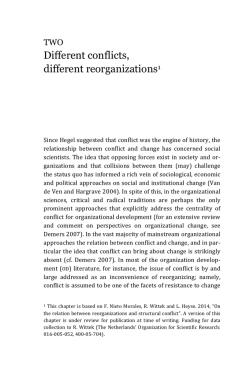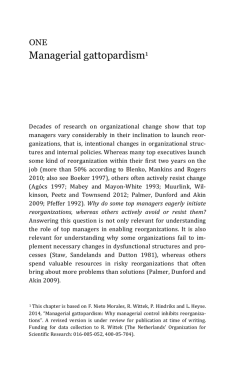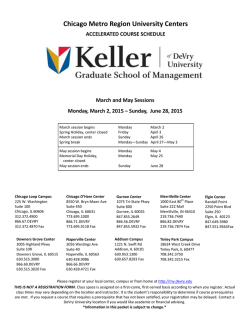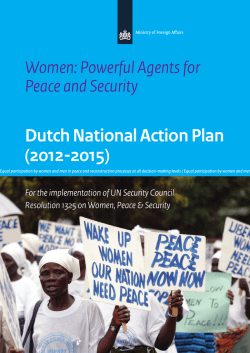
The control imperative FINAL (digital)
! ! ! ! ! ! ! THE CONTROL IMPERATIVE Studies on reorganization in the public and private sectors Fernando Nieto Morales ! ! ! ! ! ! ! ! ! ! ! ! ! ! ! ! ! ! ! ! ! ! ! ! ! ! ! ! ©!2015!by!Fernando!Nieto!Morales! ISBN!978<94<6182<535<3!(digital)!/!978<94<6182<532<2!(printed)! ! All!Rights!Reserved.!No!part!of!this!publication!may!be!reproduced!in!any!form! or!by!any!means,!including!scanning,!photocopying,!or!otherwise!without!prior! written!permission!of!the!copyright!holder.! ! Cover!design!by!Milad!Khosseini! ! ! ! ! ii ! ! ! ! ! ! ! The control imperative Studies on reorganization in the public and private sectors ! ! PhD thesis ! ! to!obtain!the!degree!of!doctor!at!the! University!of!Groningen! on!the!authority!of!the! Rector!Magnificus!Prof.!E.!Sterken! and!in!accordance!with! the!decision!by!the!College!of!Deans.! ! ! This!thesis!will!be!defended!in!public!on! ! Thursday!26!February!2015!at!16.15!hours! ! by! ! Fernando Nieto Morales born!on!16!September!1984! in!Mexico!City,!Mexico! ! iii ! ! ! ! Supervisor! ! ! Prof.!R.P.M.!Wittek! ! Co,supervisor! ! Dr.!L.!Heyse! ! Assessment!committee!! Prof.!S.M.!Lindenberg! Prof.!R.!Torenvlied! Prof.!G.M.!Cejudo!Ramírez! ! ! ! ! ! ! ! ! ! ! ! ! ! ! ! ! ! ! ! ! ! ! ! ! iv ! ! ! ! Acknowledgments ! ! ! ! ! ! ! Books!like!this!one!are!rarely!the!product!of!a!single!mind.!Along! the! way,! many! collaborated,! often! inadvertently,! through! con< versations,! discussions,! ideas,! and! sometimes,! simple! reassur< ances!of!sanity.!Above!all,!this!book!would!never! have!found!its! way! to! completion! without! the! guidance! of! my! supervisors,! Ra< fael! Wittek! and! Liesbet! Heyse.! I! learned! and! benefited! enor< mously! from! our! conversations—specially! the! heated! ones.! Working! with! you! has! been! a! truly! rewarding! and! inspiring! ex< perience.! I! am! most! grateful! for! your! encouragement! and! your! friendship.! I! also! want! to! thank! Paul! Hindriks,! María! del! Carmen! Pardo,!Miranda!Visser,!Kim!Pattiselanno,!Lea!Ellwardt,!Siegwart! Lindenberg,! René! Torenvlied,! Guillermo! M.! Cejudo,! Marijtje! van! Duijn,! Frans! Stokman,! Andreas! Flache,! Melinda! Mills,! Rie! Bosman,! Mauricio! Merino,! Manu! Muñoz,! Valeska! Korff,! Anke! Munniskma,!Katia!Begall,!Filip!Agneessens,!Alenka!Labun,!Ernes< to! Velasco,! Christoph! Stadfeldt,! Tina! Kretschmer,! Felix! Tropf,! Marcela! Vázquez,! and! members! of! the! research! group! on! work! and!organizations!of!the!Department!of!Sociology!at!the!Univer< sity! of! Groningen,! all! of! whom! offered! me! indispensable! assis< tance,!criticism!and!advice.! Special! thanks! to! Saskia! Simon,! who! managed! to! get! the! Mexican!Minister!of!the!Public!Service!himself!on!the!phone!and! make!it!look!like!an!everyday!chore.!Thanks!to!Raúl!Arceo,!Juan! Ángel!Rangel!and!other!officials!of!the!Ministry!of!the!Public!Ser< vice! of! Mexico! for! their! assistance.! Thanks! also! to! the! Nether< v ! ! ! lands! Organization! for! Scientific! Research! (NWO)! for! financing! this!project.! Thanks! to! my! father,! mother! and! sister,! to! my! “schoon< familie”! (in<laws),! and! my! friends! on! both! sides! of! the! Atlantic! and! elsewhere! for! all! their! support! through! the! years.! Finally,! thanks!to!Paul!for!making!me!smile!every!day.! ! ! ! ! ! ! ! ! ! ! ! ! ! ! ! ! ! ! ! ! ! ! ! ! ! ! ! ! ! vi ! ! ! Contents ! ! ! ! ! ! ! Tables! Figures! Acronyms! ! Introduction! 1.!Managerial!gattopardism!! 2.!Different!conflicts,!different!reorganizations! 3.!Enforcing!reorganization! 4.!Pathways!to!compliant!reorganization! 5.!After!reorganization! 6.!The!control!imperative! ! Summary! Samenvatting' Síntesis'' References' Appendix' ICS'Dissertation'series' About'the'author' ! ! ! ! ! ! ! ! ix' xi! xiii! 1! 16! 41! 65! 96! 127! 156! 179! 183' 188! 193' 224' 237' 257' vii ! ! ! ! ! ! ! ! ! ! ! ! ! ! ! ! ! ! ! ! ! ! ! ! ! ! ! ! ! ! ! ! ! ! ! ! ! ! viii ! ! ! Tables ! ! ! ! ! ! ! 1.1! 1.2! 2.1! 2.2! 2.3! 2.4! ! 3.1! 3.2! 3.3! ! 4.1! 4.2! ! 4.3! 4.4! 4.5! ! 4.6! ! 5.1! ! 5.2! ! 5.3! 5.4! ! Manifestations!of!control! MCP,!reorganization!and!controls! Different!reorganizations,!conflicts!and!controls! Different!types!of!conflict!(PCA!analysis)! Effects!of!conflict!on!incipient!reorganization! Effects!of!different!types!of!conflict!on!different! types!of!change! Strategies!for!building!up!enforcement!capacity! Overview!of!interviewees! Overview!of!consulted!documents! (SPC!case!study)! Organizations!that!belong!to!the!SPC!system! Fuzzy!sets!of!conditions!leading!to!compliant! implementation! Truth!table! Four!recipes!for!compliant!implementation! Structure,!consistency!and!coverage!of! recipes!for!compliant!implementation! Sectorial!patterns!of!compliance! implementation! Characteristics!of!public!and!private! organizations! Change!occurrence!in!public!and!private! organizations! Covariates!of!organizational!change! Logistic!regression!of!predictors!of!different! types!of!change!(reference!group:!private! 21! 29! 55! 56! 58! 59! 76! 77! 79! 106! 115! 116! 118! 120! 122! 141! 143! 144! ix ! ! ! ! 5.5! ! ! 5.6! ! 6.1! ! ! ! ! ! ! ! ! ! ! ! ! ! ! ! ! ! ! ! ! ! ! ! ! ! ! ! ! x ! organizations)! Logistic!regression!of!predictors!of!different! types!of!change!(reference!group:!public! organizations)! Summary!of!predictions!per!model!and!type! of!change! Lessons!and!evidence! 147! 148! 149! 157! ! ! Figures ! ! ! ! ! ! ! 0.1! ! 1.1! 1.2! 3.1! ! 4.1! ! 6.1! ! ! ! ! ! ! ! ! ! ! ! ! ! ! ! ! ! ! The!relation!between!control!and!! reorganizations:!an!approximation! MCP!measurement!model! Direct!effects!of!MCP!and!reorganization! Trade<off!between!coordination!! and!compliance! Compliant!SPC!implementation!in!55!! organizations! The!relation!between!control!and!change!in! perspective! 11! 33! 34! 91! 111! 165! xi ! ! ! ! ! ! ! ! ! ! ! ! ! ! ! ! ! ! ! ! ! ! ! ! ! ! ! ! ! ! ! ! ! ! ! ! ! ! xii ! ! ! Acronyms ! ! ! ! ! ! ! ASF! ! CEO! ! ! CFI! ! FSQCA! ! HRM! ! KMO!(test)! M! ! MCP!! ! MIDESPC!! CFA! MROS! ! NAFTA! ! NPM! ! OECD! OD! ! PCA! ! RMSEA! ! SD! ! SEM!! ! SFP! ! SPC! ! SPCOP! ! SRMR! ! Auditoría!Superior!de!la!Federación! (Congressional!auditing!bureau,!Mexico)! Chief!executive!officer! Confirmatory!factor!analysis! Comparative!fit!index! Fuzzy!set!qualitative!comparative!analysis! Human!resource!management! Kaiser<Meyer<Olkin!test! Mean! Managerial!control!position! Modelo!Integral!de!Evaluación!del!Servicio! Profesional!de!Carrera! Multiple!respondents!organizational!survey! North!American!Free!Trade!Agreement! New!Public!Management! Organization!for!Economic!Cooperation!and! Development! Organizational!development! Principal!component!analysis! Root!mean!square!error!of!approximation! Standard!deviation! Structural!equation!modeling! Secretaría!de!la!Función!Pública! (Ministry!of!the!Public!Service,!Mexico)! Servicio!Profesional!de!Carrera! Civil!service!operative!program! Standardized!root!mean!residual! xiii ! ! ! SROS!! ! ! UHRP! ! USD! ! WLSMV! ! ! TLI! xiv ! Single!respondent!organizational!survey! Tucker<Lewis!Index! Unit!of!Human!Resources!Policy! United!States!dollar! Weighted!least!squares!estimator! ! ! Introduction ! ! ! ! ! ! ! Margaret! “Iron! Lady”! Thatcher’s! famous! slogan! about! there! be< ing! “no! alternative”! to! neoliberalism! was! not! only! the! kind! of! cynical! phrase! you! might! expect! from! a! determined! Tory! in! the! 1980s;!it!was!also!a!kind!of!prophesy!announcing!deep!social!and! economic! changes.! Globalization—as! these! changes! came! to! be! known—refers! to! at! least! five! major! trends! in! social! and! eco< nomic!change,!which!for!the!last!three!decades!have!occupied!an! army! of! social! scientists! and! public! intellectuals:! increasingly! individualist! forms! of! consumption,! marketization! and! work;! declining!importance!of!national!borders!for!economic!activities;! rising!worldwide!interconnection!and!faster!means!of!communi< cation;! tougher! fiscal! competition! between! countries! including! efforts! to! deregulate,! privatize! and! liberalize! several! economic! sectors! and! industries;! and! the! rise! of! an! accelerated,! more! ag< gressive!and!unstable!form!of!capitalism!(Clegg!1990;!Davis!and! Meyer! 1998;! Drucker! 1993;! Lipovetsky! 2006;! Mills,! Blossfeld,! Buchholz,!Hofäcker,!Bernardi!and!Hofmeister!2008;!Milward!and! Provan!2000;!Piketty!2014;!Sandel!2012).!The!promise!of!global< ization! is! that! social! and! institutional! change! will! eventually! re< sult! in! blurred! national! borders,! global! convergence! and! pros< perity,! as! well! as! greater! choice,! freedom! and! higher! living! standards!for!individuals!(Mills!et!al.!2008).! For! policymakers! and! companies! all! around! the! world,! globalization! has! resulted! in! opportunities! and! challenges.! One! particular! challenge! sets! the! general! background! for! the! book! you!have!in!front!of!you:!the'crisis'of'traditional'models'of'organi@ ! ! INTRODUCTION! ! zation.!Changes!brought!forward!in!the!course!of!recent!decades! have!forced!decision<makers!to!rethink!the!way!companies,!non< profits! and! government! agencies! are! structured! and! managed.! Traditional!bureaucratic!models!of!organization!are!deemed!too! rigid! and! expensive;! too! engrossed! by! hierarchical! control! and! regulation! to! succeed! in! a! globalized,! fast<paced! economy! and! society! (Castells! 1996;! Johnson,! Wood,! Brewster! and! Brookes! 2009).! Commentators! reckon! that! organizations,! public! or! pri< vate,! need' to' be' reorganized:! “We! see! a! great! opportunity! for! businesses,!nonprofits!and!government!agencies!to!leave!behind! the! bureaucratic! system! of! organization! and! become! more! pro< ductive!and!more!ready!for!the!future.!These!new!organizations! will! rely! on! systems! that! develop! and! express! the! intelligence,! judgment,!collaborative!abilities,!and!a!wide<system!responsibil< ity!of!all!their!members”!(Pinchot!and!Pinchot!1994,!xiii;!see!also,! Alvesson! and! Thompson! 2006;! Osborne! and! Gaebler! 1993;! Uchitelle!2006).! This! book! studies! reorganizations,! that! is,! intentional! changes!in!the!structure!and!internal!policies!of!organizations!in! the! wake! of! mounting! globalization.! It! uses! observations! drawn! from! a! multi<method! study! involving! survey,! archive! and! inter< view!data!from!top!managers!and!public!officials!of!private!com< panies! and! government! agencies! in! both! the! Netherlands! and! Mexico!to!understand!some!of!the!mechanisms!behind!reorgani< zations;!that!is,!the!“cogs!and!wheels”!(Elster!1989)!that!explain! why!and!how!this!organizational!change!comes!about.! Reorganizations! are! important! events! in! an! organiza< tion’s! life! course.! They! affect! standard! procedures! and! reshape! organizational! systems.! Reorganizations! affect! how! managers! wield! their! authority,! how! employees! behave! and! interact,! and! how!services!are!delivered!and!goods!produced.!In!addition,!be< cause! in! the! last! decades! the! frequency! and! pace! of! reorganiza< tions! has! increased! in! capitalist! societies! (Wittek! and! Van! Wit< teloostuijn! 2012),! studying! and! understanding! the! drivers! and! effects!of!reorganizations!is!becoming!ever!more!important.! 2 ! INTRODUCTION! ! ! Everything must change… Over!a!century!ago,!Max!Weber!contended!that!bureaucracy!was! the! organizational! manifestation! par! excellence! of! modern! ra< tionalism,!and!claimed!that!the!process!of!bureaucratization!was! close! to! inescapable! (1976/1905;! 1968/1922).! The! ability! to! exert!direct,!depersonalized!control!over!employees!was,!accord< ing!to!Weber,!central!to!the!success!of!bureaucracies.!Traditional! bureaucratic! control! is! based! on! regulation,! formal! compensa< tion!and!a!hierarchy!of!authority!(Coleman!1990).!Organizational! members!are!constantly!monitored!not!only!because!they!oper< ate! with! resources! that! in! principle! are! not! theirs,! but! also! be< cause!supervision!is!necessary!to!prevent!intentional!or!uninten< tional!deviations!from!organizational!and!managerial!goals.!Judg< ing! by! how! firms! and! government! agencies! are! designed! and! managed! to! date,! it! is! evident! that! the! bureaucratic! template,! with! its! rules! and! hierarchies,! continues! to! exert! a! powerful! in< fluence!(Barzelay!1992;!DiMaggio!and!Powell!1983).! Yet,! bureaucracies! “increasingly! fail! us”! (Osborne! and! Gaebler!1993,!15;!see!also,!Kamarck!2007).!The!characteristics!of! these! organizations! have! become! a! liability! in! an! increasingly! globalized! and! dynamic! economy,! a! “burden! that! should! be! left! behind”!(Merino!2013,!95)!and!that!needs!to!be!broken!through! (Barzelay!1992).!“Reorganize!or!perish”!seems!to!be!the!message! behind!much!of!the!managerial!and!business!literature!out!there.! Companies! are! urged! to! flatten! their! structures! and! reengineer! their! processes! so! as! to! become! more! efficient,! improve! overall! capacity,! and! shareholder! value! (Beer! and! Nohria! 2000).! For! governmental! organizations,! neoliberal! policies! and! the! emer< gence!of!the!New!Public!Management!(NPM)!movement!triggered! trajectories! of! reform! aimed! at! making! governments! less! rigid! and! cheaper! to! run! (Christensen! and! Lægreid! 2011;! Pollitt! and! Bouckaert! 2004).! In! either! case,! critics! target,! often! implicitly,! 3 ! INTRODUCTION! ! what! they! see! as! outdated! and! detrimental! ideas! about! control! and! supervision.! Bureaucratic! control! leads! to! rigid! structures,! overly! formalized! functions! and! procedures,! and! overruns.! Bu< reaucratic! organizations! are! prone! to! become! inward<looking,! more! concerned! with! discipline! than! satisfying! citizens! and! cli< ents,! and! more! troubled! with! running! internal! operations! than! saving! money! or! improving! overall! efficiency! (Barzelay! 1992;! Niskanen!2007).! This! critique! draws! on! two! related! “contingency”! argu< ments.! The! first! is! that! shifting! conditions! in! the! economy! and! society,! such! as! increased! local! and! global! competition,! more! flexible! labor! markets,! technological! advancements! and! fiscal! crisis!(D’Aunno,!Succi!and!Alexander!2000;!Kamarck!2007)!have! induced!a!process!of!institutional!drift!that!is!forcing!companies! and!governments!to!abandon!traditional!bureaucratic!structures.! Companies! and! governments! are! under! rising! pressure! to! be! more! effective,! efficient! and! accountable.! According! to! an! in< creasingly! popular! viewpoint,! only! more! flexible,! responsive,! networked,! and! flattened! organizations! will! meet! the! challenge! (Ancona!et!al.!1999;!Sorge!and!Van!Witteloostuijn!2004).! Second,!increased!dynamism!and!uncertainty!are!pushing! organizations!to!invest!less!in!fixed!capital!and!instead,!progres< sively!rely!more!on!labor’s!“intelligent!effort”!(Lindenberg!2006).! This! erodes! the! basis! of! bureaucratic! governance! (Wittek! and! Van!de!Bunt!2004,!300).!Rules!and!hierarchies!are!replaced!with! consensual!forms!of!authority,!responsible!autonomy!and!team< work.!In!particular,!new!forms!of!organizational!governance!de< crease! the! prominence! of! traditional! bureaucratic! technologies! (e.g.,! control! by! rules! and! standard! operating! procedures,! task! specialization,! sequential! workflows)! and! redefine! the! employ< ment! contract! as! a! trust! relationship! between! organization! and! employees.! This! fundamental! change! is! supposed! to! empower! employees! and! increase! their! intrinsic! commitment,! which! is! a! reason! for! enthusiasm,! understandably! so.! In! the! view! of! many,! the! demise! of! traditional! bureaucracies! opens! possibilities! for! 4 ! INTRODUCTION! ! emancipation! of! employees,! greater! flexibility,! and! workplace! democratic! governance! (cf.! e.g.,! Adler! 1992;! Folta! 1998;! or! Pinchot!and!Pinchot!1994).! ! …For everything to remain the same The! emergence! and! diffusion! of! trends! of! change! toward! less! bureaucratic! and! post<bureaucratic! organizations! has! been! well! documented! (Johnson,! Wood,! Brewster! and! Brookes! 2009;! Os< terman!1994;!Senge!1990;!Smith!1996),!albeit!important!pieces! of!evidence!do!not!seem!to!support!the!argument!that!reorgani< zations!are!leading!to!less!intense!control.!A!paradox!riddles!or< ganizational! scientists! in! that! there! is! evidence! indicating! that! contemporary! reorganizations! often! lead! to! tighter! monitoring! and!increased!pressures!for!workers!to!comply,!and!bring!about! novel! nonintrusive! disciplinary! technology! (Alvesson! and! Thompson! 2006;! Clegg! 2009).! Studies! by! Blim! (2000),! Brehony! and! Deem! (2005),! Torsteinsen! (2012),! and! Vallas! (2003),! for! example,!show!that!evidence!far!from!supports!a!systematic!rup< ture! with! traditional! models! of! organization.! Some! others,! like! Barker!(1993)!or!Vallas!(1999),!cast!doubt!on!whether!reorgani< zations!create!conditions!for!labor!empowerment!and!workplace! democratic!governance.!These!studies!show!that!reorganizations! maintain!and,!in!some!cases,!strengthen!the!intensity!of!supervi< sion!and!monitoring,!and!promote!the!internalization!of!manage< rial! definitions! of! work! (Deetz! 1992;! Wittek! and! Van! de! Bunt! 2004).! To! use! Barker’s! (1993,! 408)! phrasing;! contrary! to! the! promises! of! greater! freedom! and! emancipation,! contemporary! reorganizations!appear!to!be!“tightening!the!iron!cage”.! We!think!there!is!a!simple!reason!for!this!apparent!con< tradiction.!It!is!because!control'remains'an'imperative'for'organi@ zations.' By! control,' we! mean' the! active! alignment! of! organiza< tional! subunits’! and! employees’! capabilities! with! organizational! and! managerial! goals! (Clegg! 2009;! Cyert! and! March! 1963;! Per< 5 ! INTRODUCTION! ! row!1970;!Wittek!2007).!Public!and!private!managers!are!coping! with!and!adapting!to!changes!brought!forward!by!globalization.! New! management! ideas! and! new! supervision! and! monitoring! techniques! are! devised! to! keep! up! with! technological! advance< ment.!There!are!greater!pressures!for!organizational!productivi< ty! and! accountability.! Improvements! in! educational! levels! are! giving!rise!to!new!ways!to!manage!highly!specialized!and!skilled! workers.!Frequent!financial!crises!and!austerity!policies!are!forc< ing! managers! to! keep! a! tighter! grip! on! how! valuable! resources! are! spent! and! how! employees’! output! is! measured.! In! other! words,!social!and!economic!changes!highlight!the!crucial!relation! between! planned! organizational! change! (reorganizations)! and! the!need!to!“provide!the!necessary!incentives!for!organizational! members! to! strive! for! the! achievement! of! management’s! goals,! but! also! […]! to! provide! the! conditions! and! resources! that! are! necessary!for!carrying!out!these!tasks”!(Wittek!2007,!85).! ! This!book!takes!on!the!scientific!problem!of!understand< ing!the!relation!between!control!and!reorganizations.!In!a!way,!it! tells!the!story!of!reorganizations!from!a!control!perspective,!giv< en! three! decades! of! intensifying! globalization.! More! specifically,! we! ask! to' what' extent' and' how' contemporary' reorganizations,' including' their' implementation' and' outcomes,' are' powered' and' shaped'by'purposive'efforts'to'gain,'retain'and'increase'control.! Control!is!a!central!concept!in!the!study!of!organizations,! at! least! “since! the! time! of! Weber! and! remains! perhaps! the! key! issue! that! shapes! and! permeates! our! experiences! of! organiza< tional!life”!(Barker!1993,!409).!However,!most!analyses!on!con< trol! focus! on! specific! aspects! of! this! multifaceted! phenomenon.! For! instance,! rationalist! approaches! focus! on! issues! of! compli< ance! and! coordination,! culturalist! approaches! on! legitimacy! of! control,! and! structuralist! approaches! on! the! interplay! between! control! and! issues! of! cooperation! (for! a! review,! see! Wittek! 2007).! We! propose! to! embrace—rather! than! circumvent—the! fact! that! control! in! organizations! has! multiple! facets! and! mani< festations.!In!this!spirit!and!aiming!to!add!to!existing!scholarship,! 6 ! INTRODUCTION! ! studies! in! this! book! acknowledge! both! formal! (e.g.,! rules,! re< sources)!and!informal!(e.g.,!norms,!trust)!aspects!related!to!con< trol!(Etzioni!1961;!Wittek!2007),!as!well!as!temporal!and!struc< tural! manifestations! of! control! (see! below,! pp.19<24).! On! this! basis,! we! attempt! to! explicate! the! processes! behind! reorganiza< tion!efforts!in!the!public!and!private!sectors,!and!to!provide!the< oretical!tools!to!this!end.! Further,! the! studies! in! this! book! complement! previous! academic!work,!often!based!on!the!idea!that!reorganizations!are! driven! mainly! by! ecological! changes! (i.e.,! changes! in! the! envi< ronment!of!organizations),!making!organizational!change!a!con< tingent! or! adaptive! reaction! (March! 1981;! Sorge! and! Van! Wit< teloostuijn! 2004).! We! think! that! to! fully! understand! change! in! organizations,! we! need! to! reformulate! extant! contingency! argu< ments!in!order!to!pay!closer!attention!to!internal!organizational! phenomena,!and!how!these!affect!the!possibilities!and!outcomes! of!reorganizations.!The!answer!we!hope!to!offer!is!thus!based!on! the! idea! that! the! need! to! gain! and! keep! control! influences! the! motives!and!implementation!process!of!reorganizations,!and!that! reorganizations!in!turn!affect!the!nature!and!intensity!of!control.! When! managers! and! government! officials! decide! to! embark! on! and! implement! reorganizations,! they! commit,! even! tacitly,! to! efforts!that!presumably!improve!organizations’!capacity!to!reach! their!goals,!which!implies!the!capacity!to!exert!or!attain!control.! Something! similar! can! be! said! of! the! process! of! change! itself.! Implementing! changes! entails! that! organizations! and! managers! are! able! to! somehow! direct! multiple! players,! actions! and! re< sources.!Successful!reorganization!depends!on!being!able!to!en< force! and! control! implementation! of! changes! (Hardy! 1996).! As! we!shall!see,!the!relation!between!planned!organizational!change! (reorganizations)! and! control! is! composite,! reciprocal! and! per< vasive! across! different! phases! of! the! reorganization! process.! Control! is! a! crucial! intervening! factor! in! the! motivation,! imple< mentation!process!and!outcome!of!reorganizations.! ! 7 ! INTRODUCTION! ! Cases and data sources We! make! use! of! empirical! data! from! several! private,! public! and! government! organizations! in! two! different! countries.! In! both! countries,! the! effects! of! global! social! and! economic! changes! are! remarkably! evident.! More! important,! however,! given! our! inter< est! in! general! mechanisms! underlying! the! relation! between! re< organizations! and! control,! the! cases! provide! us! with! the! oppor< tunity! to! study! multiple! facets! of! control! and! their! relation! to! reorganizations,! in! different! contexts.! Data! from! Dutch! private! organizations!help!us!to!understand!some!managerial!processes! behind! reorganization! in! companies.! Also,! data! from! Dutch! pri< vate!and!public!establishments!is!useful!to!compare!cross<sector! variations.!Information!on!the!implementation!of!a!reform!span< ning! a! wide! variety! of! governmental! organizations! of! the! Mexi< can! federal! government! is! useful! to! study! implementation! pro< cesses! of! public! sector! reforms.1! By! analyzing! these! different! cases,!our!study!broadens!the!scope!of!previous!research,!which! is! often! focused! only! on! a! single! organization! or! a! number! of! organizations! in! a! particular! sector,! and! is! largely! devoted! to! Western!(developed)!cases.! On! the! one! hand,! the! Netherlands! is! one! of! wealthiest,! long<standing!democracies,!with!very!high!living!standards,!and! one!of!the!most!technologically!advanced!and!competitive!econ< omies!in!the!world!(see,!e.g.,!OECD’s!Better!Life!Index,!available!at! www.oecdbetterlifeindex.org).!The!Dutch!economy!plays!also!an! important! role! in! the! European! economic! integration! process,! and! it! is! often! portrayed! as! an! example! of! successful! economic! governance!(Kraan!2005).!Along!with!other!developed!countries! inspired! by! neoliberal! economics! and! the! NPM! movement,! the! Dutch! initiated! extensive! programs! of! reform! in! the! 1980s! and! 1990s,!which!led!to!privatization,!deregulation!and!liberalization! ! 1! Details! of! the! data! and! data! collection! procedures! are! presented! and! dis< cussed!in!subsequent!chapters.! ! 8 ! INTRODUCTION! ! of! the! economy! and! the! public! sector! (Pollitt! et! al.! 2001;! Ter! Borgt!and!Helden!2000).!The!Netherlands!showed!good!econom< ic! performance! throughout! the! 1990s,! well! above! European! av< erage.!However,!and!like!other!developed!countries,!the!Nether< lands! suffered! in! the! global! economic! deceleration! of! the! 2000s! and!the!subsequent!European!Debt!Crisis,!when!Dutch!industrial! output!fell!considerably!(Evans<Pritchard!2008).!In!Chapters!1,!2! and! 5,! we! use! survey! data! from! a! single! respondent! organiza< tional! panel! of! Dutch! public! and! private! managers! and! estab< lishments!collected!in!2003!and!2006.! ! Mexico,!on!the!other!hand,!is!a!newly!industrialized!coun< try—as!are!Brazil,!Indonesia,!China,!India,!and!others.!It!has!one! of! the! largest! economies! in! the! world,! and! is! strongly! linked! to! the! United! States! and! Canada! through! the! North! American! Free! Trade!Agreement!(NAFTA).!Like!other!newly!industrialized!coun< tries,!Mexico!has!a!high!degree!of!income!inequality,!corruption,! and! great! geographic! and! demographic! disparities! in! develop< ment!and!living!standards!(Acemoglu!and!Robinson!2012).!Fur< ther,! for! most! of! its! history,! Mexico! experienced! limited! demo< cratic!development.!Throughout!most!of!the!twentieth!century,!a! single!political!party!and!a!patronage<based!administration!were! dominant! (Arellano! Gault! 1999).! Only! by! the! end! of! the! 1980s,! the!political!system!began!experiencing!increased!electoral!com< petition! and! democratization.! This! coincided! with! major! eco< nomic! reforms! that! deregulated! and! privatized! several! key! in< dustries! and! significantly! reduced! the! size! of! the! public! sector! (Haber,!Klein,!Maurer!and!Middlebrook!2008).!After!2000,!when! the!opposition!won!the!presidential!election!for!the!first!time,!a! new! round! of! administrative! and! political! reform! was! initiated.! Some! of! these! reorganizations! were! intended! to! modernize! the! public! administration,! and! increase! its! efficiency! and! transpar< ency! (Cejudo! 2007).! One! such! reform—the! 2003! Civil! Service! Reform! Act,! or,! in! Spanish,! “Servicio! Profesional! de! Carrera”— provides!us!with!a!very!useful!example!of!how!governments!at< tempt!to!reorganize!their!agencies,!not!only!in!response!to!global! 9 ! INTRODUCTION! ! pressures!for!modernization!and!accountability,!but!also!because! of!the!need!to!regain!and!maintain!control!(Cejudo!2008;!Pardo! 2005).! In! Chapters! 3! and! 4,! we! use! data! from! a! multiple! re< spondent!organizational!survey!in!55!organizations!of!the!Mexi< can! federal! government! collected! in! 2012,! as! well! as! in<depth! interview!data!from!high<ranking!officials!in!charge!of!enforcing! and!implementing!this!reform.! ! The!cases!and!data!used!throughout!the!book!present!an! opportunity!to!examine!reorganizations!in!different!institutional! and! sectorial! settings.! To! be! sure,! using! data! from! public! and! private!organizations!in!two!countries!as!different!as!Mexico!and! the!Netherlands!has!its!limitations,!as!we!will!discuss!duly.!Nev< ertheless,! this! research! design! does! provide! a! rich! supply! of! quantitative!and!qualitative!data.!This!is!an!asset!because!expli< cating! the—often<complex—relation! between! control! and! reor< ganizations! calls! for! multifaceted! data.! This! enables! a! more! fer< tile!analysis!of!the!evidence,!and!offers!the!possibility!to!appraise! theoretical! mechanisms! and! hypotheses! with! multiple! methods,! including! statistical! analyses,! process<tracing! and! qualitative! comparison.! Accordingly,! our! study! uses! a! multi<method! ap< proach! that! combines! quantitative,! qualitative! and! mixed! meth< ods!(see!Mahoney!and!Goertz!2006).! ! Control and reorganizations: an approximation At!large,!the!studies!presented!in!this!book!have!at!least!two!im< portant! goals.! First,! each! chapter! is! intended! to! help! us! under< stand! whether! and! how! efforts! to! gain! and! keep! control! affect! and! are! influenced! by! trajectories! of! planned! organizational! change!in!companies!or!governments.!The!second!goal!is!to!pro< vide! insight! into! empirical! puzzles,! where! available! evidence! tells!us!that!something!we!know!is!wrong!or!where!conventional! wisdom!about!reorganizations!(or!control)!is!not!based!on!theo< ry!(cf.!Elster!1998).!Our!study!proceeds!sequentially!through!the! 10 ! INTRODUCTION! ! reorganization! process.! To! order! the! exposition,! we! focus! on! three! issues! familiar! to! the! literature! on! planned! organizational! change! and! change! management! (Figure! 0.1):! motives! behind! reorganizations,!implementation!problems,!and!the!aftermath!of! reorganizations.! ! ! FIGURE!0.1!—The'relation'between'control'and'reorganiza@ tions:'an'approximation! ! ! ! Antecedents ! The! first! issue! deals! with! the! motives! behind! reorganizations.! We!focus!on!the!role!played!by!control!in!the!decision!of!whether! or!not!to!embark!on!changes.!Popular!“flexibilization”!narratives! 11 ! INTRODUCTION! ! emphasize! fast<paced! adjustment! to! changing! environmental! conditions!and!movements!toward!unbridled!strategic!flexibility! (Sorge!and!Van!Witteloostuijn!2004).!By!contrast,!internal!organ< izational! factors,! such! as! managerial! control,! play! a! limited! role! in!extant!explanations!of!planned!organizational!change.!Is!man< agerial! control! or! the! lack! thereof! an! antecedent! of! reorganiza< tion?! If! it! is,! we! should! discover! that! variations! of! managerial! control! relate! to! different! properties! of! reorganization,! for! ex< ample,!the!frequency!or!type!of!change.!In!Chapter!1,!we!ask!why' is' it' that' some' managers' readily' embark' on' reorganizations,' whereas'others'avoid'them.!This!chapter!advances!a!“managerial! gattopardism”! thesis,! which! claims! that! managers! are! likely! to! avoid! reorganizations,! unless! these! are! deemed! useful! to! im< prove! their! control! position.! We! hypothesize! that! the! weaker! a! managers’! control! position,! the! more! likely! the! occurrence! of! reorganizations.! In! order! to! assess! the! empirical! validity! of! this! claim,!we!use!longitudinal!survey!data!from!top!managers!in!the! Netherlands!collected!in!2003!and!2006,!and!structural!equation! modeling!techniques.! Chapter!2!presents!a!study!of!the!role!of!loss!of!control!due! to!conflict!as!antecedent!of!different!types!of!reorganizations.!In! particular,! the! chapter! examines! the! relationship' between' struc@ tural' organizational' conflict' and' the' likelihood' and' type' of' reor@ ganizations.!Using!a!distinction!between!“type! E”!(structural!ad< justments)! and! “type! O”! (changes! aimed! at! increasing! organiza< tional!capacity)!reorganization,!we!theorize!that!distinct!forms!of! structural! differentiation! relate! to! different! types! of! structural! conflict,! and! that! these! in! turn! relate! to! different! types! of! reor< ganization.! We! hypothesize! that! vertical! conflict! (i.e.,! conflict! between!superiors!and!subordinates)!relates!to!type! E!reorgani< zation,! and! by! contrast,! horizontal! conflict! (conflicts! among! or< ganizational! subunits! laterally! placed! or! within! peer<to<peer! processes)!relates!more!closely!to!type!O!reorganizations.!We!put! these!ideas!to!the!test!with!survey!data!from!Dutch!managers!in! private!establishments.!We!use!logistic!models!that!allow!us!for! 12 ! INTRODUCTION! ! estimating! the! likelihood! of! (different! types! of)! reorganization,! given!different!types!of!conflict.! ! Implementation ! The! second! issue! deals! with! problems! of! implementation.! The! central! question! is! whether,! and! under! what! conditions,! imple< menters!gain!control!over!implementation.!If!control!plays!a!role! in! change! implementation,! then! we! could! expect! to! find! that! qualitative! variations! in! control! lead! to! qualitatively! different! results,! or! that! implementers! operating! in! organizations! with! different! characteristics! differ! with! regard! to! the! way! they! achieve!control!over!implementation.!We!first!look!at!the!process! of! creating! and! securing! enforcement' capacity,! that! is,! attaining' and' sustaining' control' in' order' to' implement' reorganizations.! In! Chapter!3,!we!pose!that!building!enforcement!capacity!is!crucial! for! the! success! of! public! management! reforms.! However,! this! aspect! of! reforms! does! not! receive! much! attention! in! extant! re< search.!We!analyze!the!process!of!building!enforcement!capacity! for! the! case! of! the! Mexican! 2003! Civil! Service! Reform! Act.! Alt< hough! this! reorganization! experienced! several! complications! (e.g.,!limited!support,!resources!and!credibility),!important!goals! and!partial!control!over!implementation!were!attained.!We!study! how!officials!achieved!this!through!the!management!of!combina< tions! of! different! types! of! control! strategies.! We! pay! special! at< tention!to!the!use!of!“soft”!(normative!and!procedural)!strategies! that!enable!implementers!to!attain!coordination!and!compliance.! This! chapter! also! explores! how! the! process! of! building! up! en< forcement!capacity!can!affect!the!goals!of!reorganization,!poten< tially!deviating!from!policymakers’!intent.!In!order!to!study!and! trace! these! processes,! we! use! data! from! interviews! with! high< level!officials!of!the!Mexican!government.!We!use!stream!analy< sis! (Porras! 1987)! to! reconstruct! critical! stories,! which! in! turn! permitted! us! to! identify! strategies! and! patterns! of! enforcement! and!implementation.! 13 ! INTRODUCTION! ! Next,!we!turn!to!the!study!of!the!conditions!under!which! reorganizations! are! successfully! implemented.! In! particular,! Chapter! 4! addresses! the! issue! of' implementation' of' reorganiza@ tions' in' organizations' with' different' characteristics,! including! different! resource! endowments.! A! traditional! technocratic! ap< proach! on! implementation! stresses! the! need! for! committing! large! resource! endowments! and! setting! up! formal! controls! in! order! to! successfully! implement! reorganization.! Building! on! an! institutional! framework,! we! argue! that! there! are! alternative! pathways! to! compliant! implementation! for! organizations! with! limited! resource! endowments.! Particularly,! we! study! the! role! played! by! limited! resources! in! combination! with! (oppositional)! norms!and!interpersonal!trust!in!enabling!successful!reorganiza< tion!in!governmental!organizations.!In!order!to!test!our!ideas,!we! use!panel!data!from!55!ministries!and!government!agencies!ex< posed! to! the! same! reform! (the! Mexican! 2003! Civil! Service! Re< form).! Using! fuzzy! set! qualitative! comparative! analysis! (FSQCA),! we! are! able! to! systematically! compare! organizations! and! deter< mine! different! implementation! “recipes”! leading! to! compliant! implementation.! ! Aftermath ! The!third!issue!deals!with!the!aftermath!of!reorganizations.!Con< trol!can!also!be!influenced!by!change,!in!the!sense!that!reorgani< zations! may! affect! the! quality! of! control! systems.! If! they! do,! we! could!discover,!for!example,!that!efforts!of!planned!organization< al!change!decrease!previous!differences!in!control!across!private! and!public!organizations.!In!Chapter!5,!we!examine!claims!made! by! proponents! of! the! NPM! movement! that! expect! precisely! that! public'organizations'will'become'more'flexible'and'adaptive'after' administrative' reorganizations,! effectively' showing' similar' pat@ terns' of' change' to' the' private' sector.! We! test! this! “convergence! argument”! and! analyze! whether! public! organizations! have! changed! their! organizational! structures! and! internal! policies! in! 14 ! INTRODUCTION! ! relation! to! competitive,! regulatory! and! autonomy! pressures,! similarly! to! private! organizations.! We! use! survey! data! from! Dutch!public!and!private!organizations!and!moderation!analyses! to! determine! sectorial! differences! and! similarities! after! three! decades!of!NPM!reform!in!the!Netherlands.! Chapter! 6! concludes! by! summarizing! and! discussing! the! most! important! results,! and! seeks! to! answer! the! main! question! above:! whether! contemporary! reorganizations! are! shaped! by! purposive! efforts! to! gain! or! maintain! control.! It! also! offers! an! outline! of! avenues! for! future! research,! and! summarizes! some! implications!for!theory!and!practice.! 15 !
© Copyright 2026




